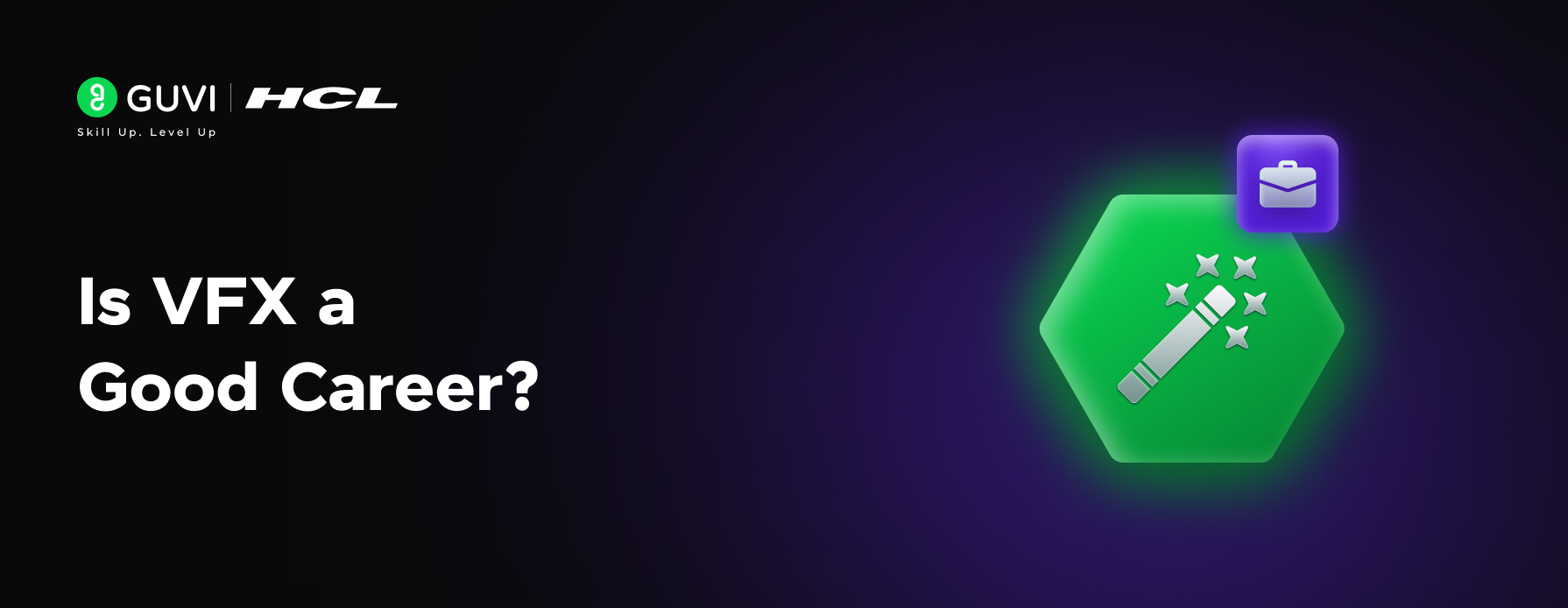
Is VFX a Good Career? Everything You Need to Know!
Jan 23, 2025 6 Min Read 1979 Views
(Last Updated)
“How do they make all of this look so real?” is the first question that comes to our mind whenever we see a mind-boggling movie like Avatar or Brahmastra. That’s the magic of Visual Effects, or VFX for short. The next question that comes up if you are interested in VFX is, “Is VFX a good career?”
VFX brings the impossible to life, whether it’s fantasy, period drama, mystical creatures, imaginative world, everything is possible when you have VFX at your hand. Of course, VFX is one of the best career options that could combine your creativity with technology.
Let’s dive in and explore everything about a career in VFX, so you can make the right decision.
Table of contents
- What Exactly Is VFX?
- Why is VFX a Booming Industry?
- Is VFX the Right Career for You?
- What Skills Do You Need for a Career in VFX?
- Technical Skills
- Artistic Skills
- Soft Skills
- Career Options in VFX: What Can You Do in This Exciting Field?
- Compositor
- 3D Modeler
- VFX Artist
- Animator
- VFX Supervisor
- Matte Painter
- Technical Director (TD)
- Lighting Artist
- Rigging Artist
- Environment Artist
- Which Career Path Should You Choose?
- How to Start Your VFX Career?
- Salary Expectations in India for VFX Professionals
- Entry-Level Roles
- Mid-Level Roles
- Senior-Level Professionals
- Freelancing
- Pros and Cons of a VFX Career
- Pros
- Cons
- Conclusion
- FAQs
- What makes VFX a good career choice?
- Do I need a degree to start a career in VFX?
- Is the VFX industry stable in terms of job security?
- How much can I earn as a VFX professional in India?
- Is the VFX industry stressful?
What Exactly Is VFX?
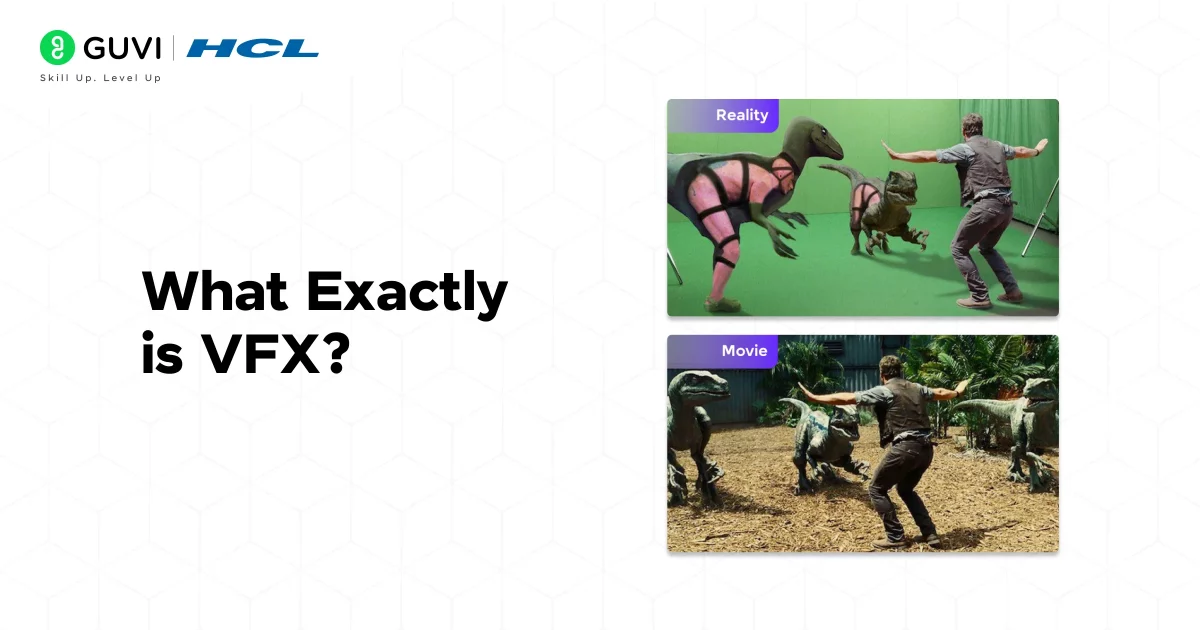
Before we get into the question of whether VFX is a good career, let’s clear up what VFX actually is.
Visual Effects refers to the process of creating imagery that cannot be captured in real life. This could mean crafting lifelike alien worlds, adding a massive dragon to a medieval battle scene, or even something as subtle as replacing a dull sky with a stunning sunset.
VFX is commonly used in:
- Movies and TV shows: Think about epic sci-fi films, fantasy worlds, or period dramas where they recreate historical settings.
- Video games: Every time you see detailed environments, characters, or action sequences, there’s VFX involved.
- Advertisements: From dazzling product launches to futuristic visuals, VFX plays a significant role here too.
So, if you’re someone who loves creating, imagining, and bringing ideas to life, VFX could be a path worth considering.
Why is VFX a Booming Industry?
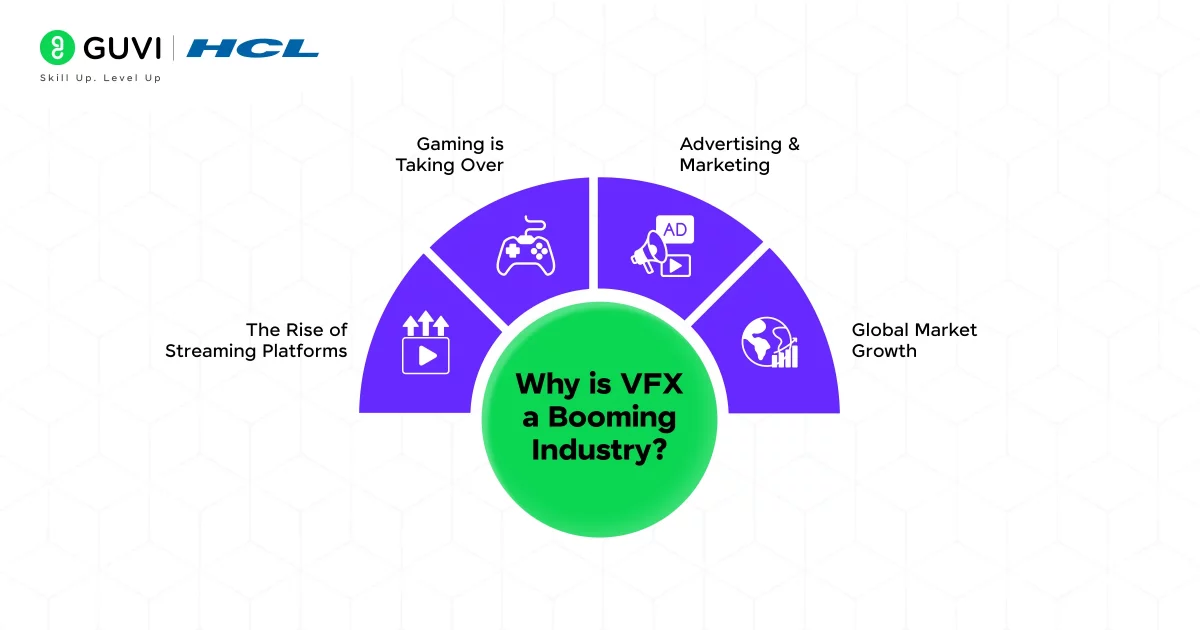
The entertainment industry is bigger than ever, and the demand for high-quality visual content has skyrocketed. Let’s look at some reasons why VFX is here to stay and not gonna disappear anytime in the future:
- The Rise of Streaming Platforms
With platforms like Netflix, Amazon Prime, and Disney+ pumping out original content, there’s an endless need for visually stunning productions. Each of these shows and movies requires VFX artists to bring creative visions to life. - Gaming Is Taking Over
The gaming industry is booming, and VFX plays a major role in making games immersive and engaging. From creating realistic characters to designing entire virtual worlds, VFX artists are in high demand. - Advertising and Marketing
Brands are getting more creative with their campaigns. VFX helps them make eye-catching advertisements that stand out in a crowded market. - Global Market Growth
According to industry reports, the global VFX market is growing at a steady pace and is expected to nearly double by 2032. This means more opportunities for professionals in the field.
Is VFX the Right Career for You?
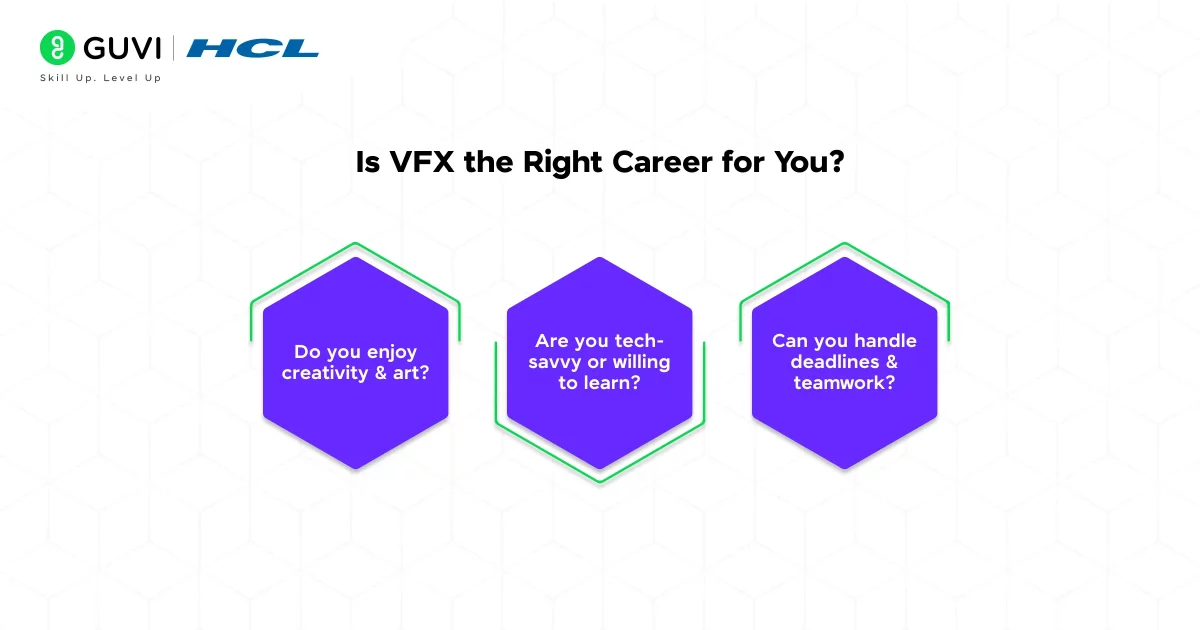
Now that you know the industry is booming, you might be wondering: “Is VFX a good career for me?” Here are some questions to help you figure that out:
- Do you enjoy creativity and art?
VFX is all about imagining new worlds and creating something from scratch. If you love drawing, designing, or anything artistic, this career might be a great fit. - Are you tech-savvy or willing to learn?
VFX isn’t just about creativity—it’s also about mastering software and tools. You’ll need to get comfortable with programs like Autodesk Maya, Houdini, and Adobe After Effects. - Can you handle deadlines and teamwork?
The VFX industry is fast-paced and collaborative. You’ll often work in teams and face tight deadlines, especially during major projects.
If you answered “yes” to most of these, VFX is a good career for you.
What Skills Do You Need for a Career in VFX?
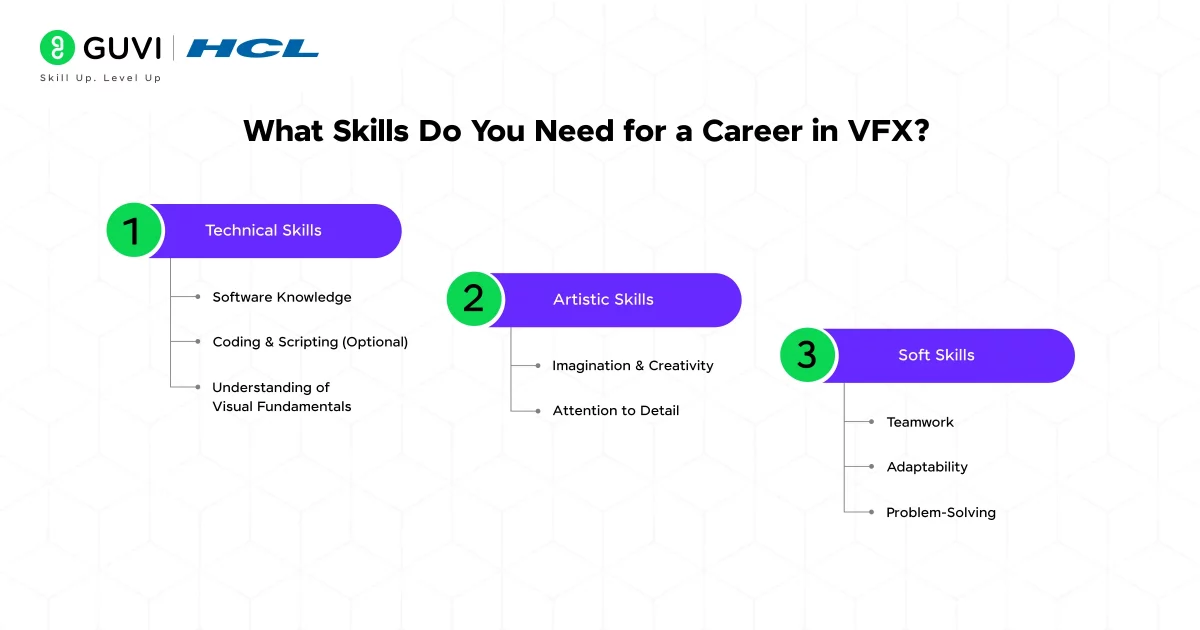
Now that you understand VFX might be a potential career for you, but to thrive in VFX, you’ll need a mix of creativity, technical expertise, and soft skills. Let’s break it down:
Technical Skills
- Software Knowledge
Learning industry-standard tools is a must. Some popular ones include:- Autodesk Maya (for 3D modeling)
- Houdini (for effects like explosions and smoke)
- Nuke (for compositing)
- ZBrush (for sculpting characters)
- Adobe Suite (Photoshop, After Effects, etc.)
- Understanding of Visual Fundamentals
Concepts like lighting, composition, and color theory play a massive role in creating believable visuals. - Coding and Scripting (Optional)
While not mandatory for everyone, knowing scripting languages like Python can give you an edge, especially for technical roles.
Artistic Skills
- Imagination and Creativity
You’ll need to think outside the box to bring fantastical ideas to life. - Attention to Detail
Whether it’s a character’s hair blowing in the wind or the reflection in a window, tiny details matter in VFX.
Soft Skills
- Teamwork
VFX projects are collaborative, involving animators, directors, and designers. - Problem-Solving
You’ll often need to troubleshoot and find creative solutions when things don’t go as planned. - Adaptability
The industry evolves quickly, so you’ll need to keep up with new trends and technologies.
Career Options in VFX: What Can You Do in This Exciting Field?
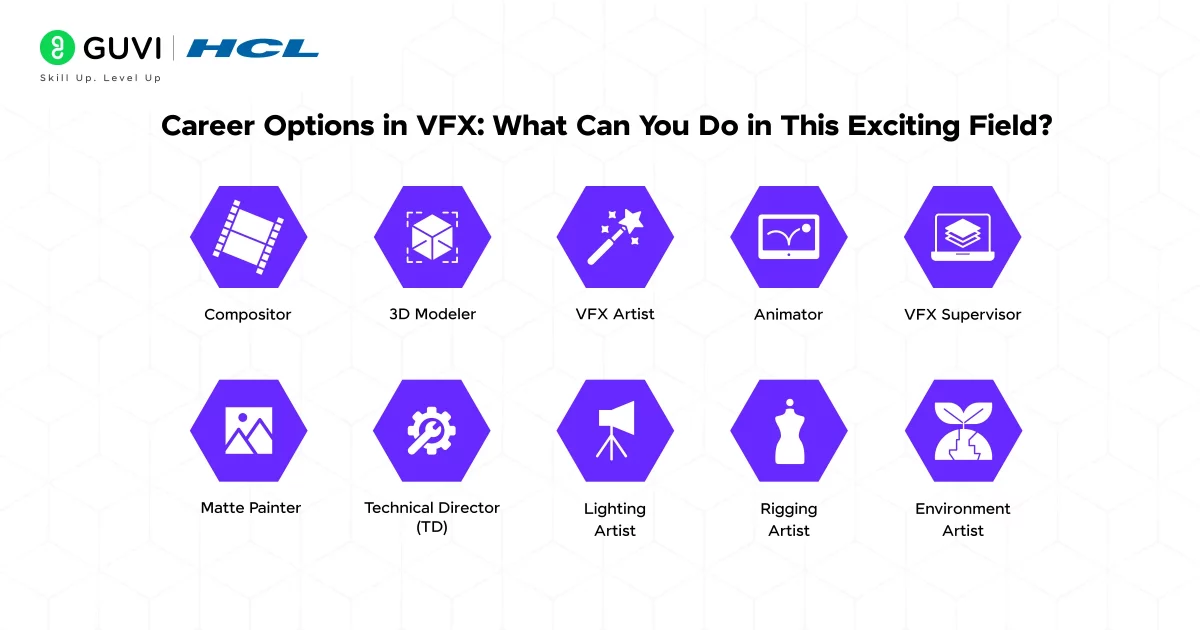
A career in VFX opens the door to a world of creativity, technology, and storytelling. But if you’re new to this, you might be wondering, “What kind of jobs are there in VFX?” Don’t worry, let’s break it down for you in simple terms.
1. Compositor
A compositor’s job is like putting together a puzzle where all the pieces come from different places. Imagine a scene in a movie where an actor is standing on a snowy mountain, but the mountain was shot separately, and the snow is added digitally.
A compositor blends these elements—footage, CGI (computer-generated imagery), background plates, and effects—into a single, seamless shot.
- Who is this for? People who have an eye for detail and love making things look perfect.
- Key Skills: Knowledge of compositing software like Nuke or Adobe After Effects.
2. 3D Modeler
3D modelers create digital objects that can be used in movies, games, or ads. Think about a giant spaceship in a sci-fi movie or a realistic car in a video game. These were first “built” digitally by 3D modelers before being animated or added to a scene.
- Who is this for? Someone who loves building things from scratch and enjoys designing objects.
- Key Skills: Proficiency in software like Autodesk Maya, Blender, or ZBrush.
3. VFX Artist
This is a broad role, and it usually involves creating special effects like explosions, rain, fire, smoke, or even magical spells. Remember those dramatic superhero action sequences? That’s the work of a VFX artist.
- Who is this for? Those who enjoy adding excitement and drama to visual stories.
- Key Skills: Expertise in tools like Houdini, Maya, or After Effects.
4. Animator
Animators are the ones who make things move. Whether it’s a dragon flying across the screen or a character running, animators bring life to static objects. In VFX, animation often overlaps with other roles like modeling and rigging.
- Who is this for? Creative individuals who love storytelling through movement.
- Key Skills: Animation software knowledge (Maya, Blender) and an understanding of timing and motion.
5. VFX Supervisor
This is a leadership role where you oversee the entire VFX process for a project. The VFX supervisor ensures that the visual effects align with the director’s vision and meet technical standards.
- Who is this for? Experienced professionals who enjoy managing teams and taking charge of creative decisions.
- Key Skills: In-depth VFX knowledge, project management skills, and creative leadership.
6. Matte Painter
Matte painters create detailed backgrounds and environments that don’t exist in real life. For example, if a movie needs a fantasy castle on a cliff, a matte painter designs and paints it digitally.
- Who is this for? Artists who excel in creating visually stunning environments.
- Key Skills: Digital painting tools like Photoshop and an understanding of perspective and lighting.
7. Technical Director (TD)
Technical directors focus on the “behind-the-scenes” aspects of VFX. They create tools, manage workflows, and ensure the technical side of the process runs smoothly. For example, they might develop software that helps animators create realistic water or fire effects.
- Who is this for? Tech enthusiasts who also have a creative side.
- Key Skills: Programming (Python, C++), knowledge of VFX software, and problem-solving abilities.
8. Lighting Artist
Lighting artists focus on adding light and shadows to digital scenes, making them look more realistic or enhancing the mood. For example, they might adjust lighting to make a nighttime scene feel eerie or a sunrise feel warm and inviting.
- Who is this for? People with an artistic eye for detail who understand how lighting changes the feel of an image.
- Key Skills: Knowledge of rendering engines like Arnold or V-Ray and an understanding of color theory.
9. Rigging Artist
Before animators can make a character move, rigging artists create a “skeleton” for the character. These digital bones allow the character to bend, twist, and perform realistic movements.
- Who is this for? Those who enjoy the technical side of bringing characters to life.
- Key Skills: Expertise in rigging tools within software like Maya or Blender.
10. Environment Artist
Environment artists design and build immersive virtual worlds. Whether it’s a bustling cityscape or a deserted alien planet, they create the settings that make stories come to life.
- Who is this for? Artists who love crafting realistic or imaginative landscapes.
- Key Skills: Tools like Maya, Blender, Unreal Engine, or Unity.
Which Career Path Should You Choose?
Your choice depends on your interests and strengths:
- If you love art and design, roles like 3D modeling, matte painting, or environment creation might suit you.
- If you’re more into technical problem-solving, consider becoming a technical director or rigging artist.
- If you’re all about storytelling, animation or compositing might be your thing.
How to Start Your VFX Career?
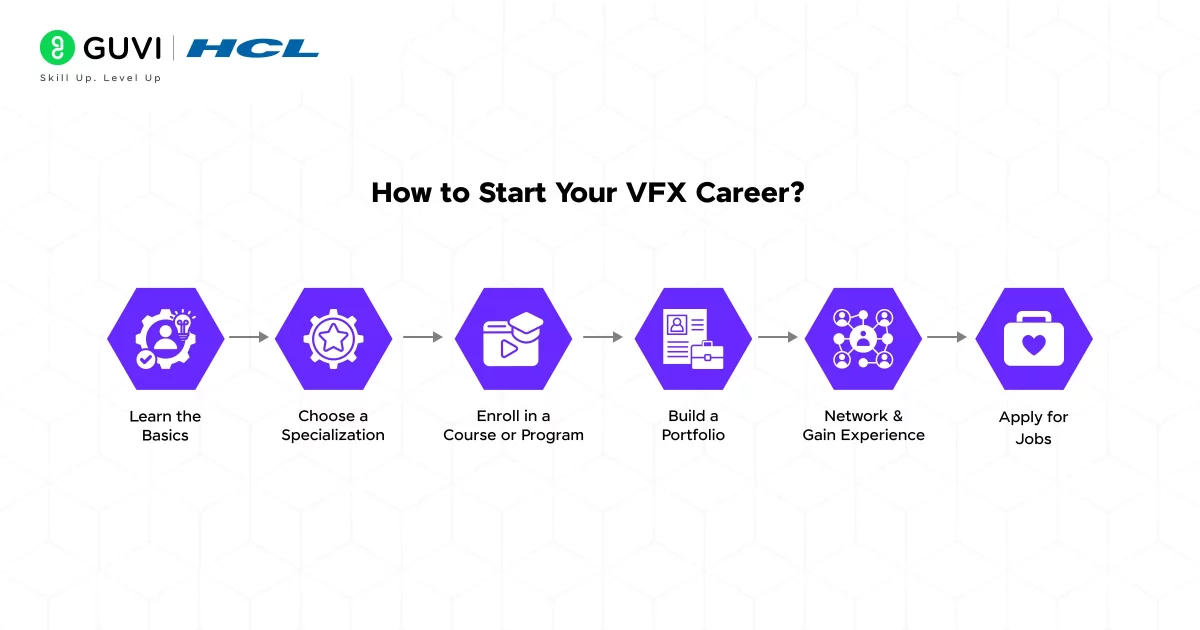
If you’re starting from scratch, here’s a step-by-step guide:
- Learn the Basics
Start with free resources on YouTube or beginner courses on platforms like Coursera, Udemy, or Skillshare. - Choose a Specialization
Decide which area excites you the most—animation, compositing, effects, etc. - Enroll in a Course or Program
Formal training can help you build skills faster. Many institutes offer VFX programs, both online and offline. - Build a Portfolio
Your portfolio is your calling card. Include your best work to showcase your skills. - Network and Gain Experience
Internships, freelance projects, or even collaborating with indie filmmakers can give you valuable experience. - Apply for Jobs
Start applying for entry-level roles like junior VFX artist or compositor.
Salary Expectations in India for VFX Professionals
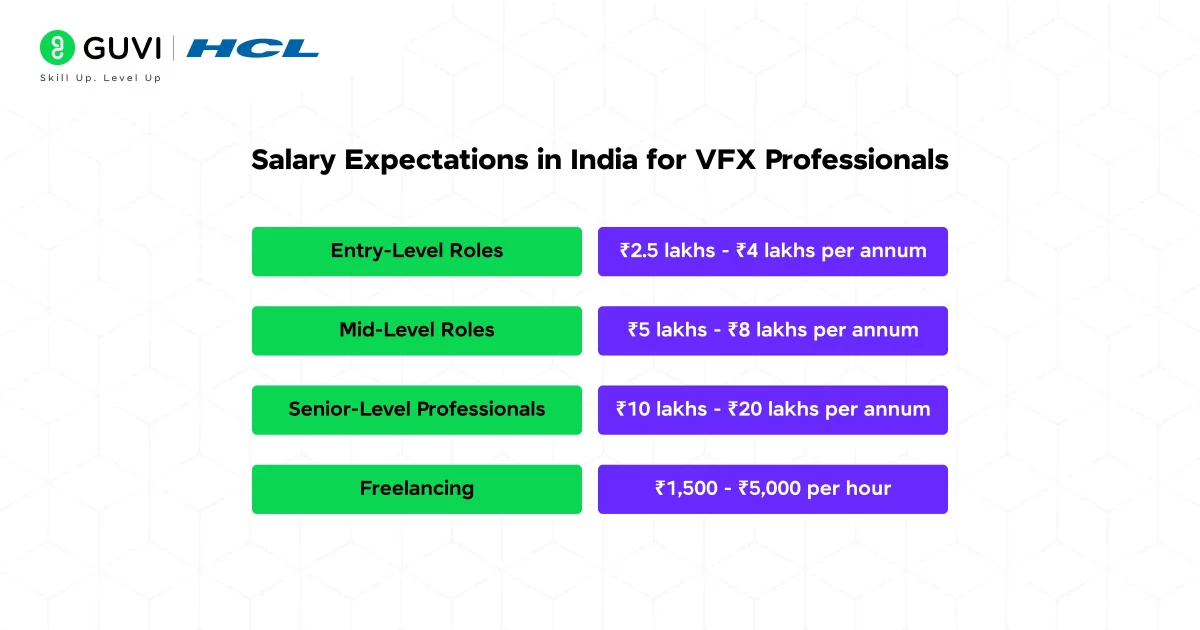
When considering a career in VFX, one of the most common questions is, “How much can I earn?” Salaries in India can vary depending on your experience, skillset, and the company you work for. Here’s a detailed breakdown:
Entry-Level Roles
As a fresher, starting salaries in India typically range between ₹2.5 lakhs to ₹4 lakhs per annum. These roles are usually in smaller studios or as junior VFX artists in larger production houses. Your portfolio and software expertise play a huge role in determining your starting pay.
Mid-Level Roles
With around 3-5 years of experience, you can expect salaries to rise to ₹5 lakhs to ₹8 lakhs per annum. At this stage, you might take on more responsibilities like leading small teams, handling complex tasks, or working on high-profile projects.
Senior-Level Professionals
For experienced professionals with 7+ years in the industry, salaries can range from ₹10 lakhs to ₹20 lakhs per annum or even higher in major studios or international projects. Senior artists, supervisors, and technical directors are among the highest earners in this category.
Freelancing
Many VFX professionals in India choose freelancing as it offers flexibility and the potential to earn more. Freelancers typically charge ₹1,500 to ₹5,000 per hour, depending on their expertise and the complexity of the project. High-profile or international freelance gigs can pay significantly more.
Pros and Cons of a VFX Career
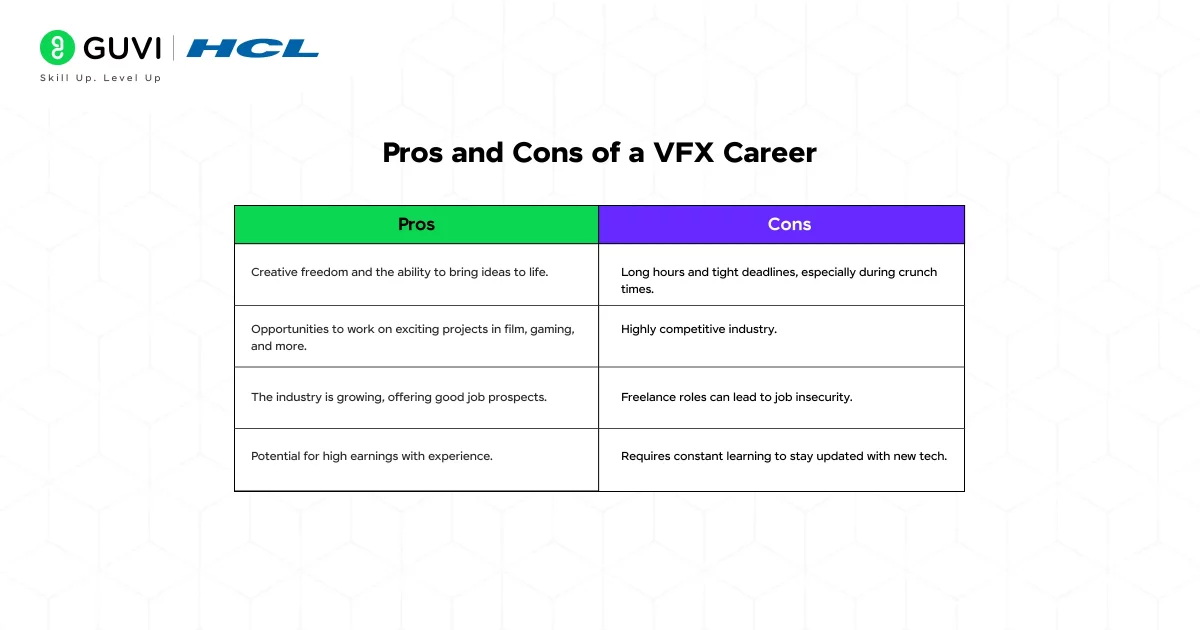
Every career has its ups and downs and so does VFX. Here’s what you need to know:
Pros
- Creative freedom and the ability to bring ideas to life.
- Opportunities to work on exciting projects in film, gaming, and more.
- The industry is growing, offering good job prospects.
- Potential for high earnings with experience.
Cons
- Long hours and tight deadlines, especially during crunch times.
- Highly competitive industry.
- Freelance roles can lead to job insecurity.
- Requires constant learning to stay updated with new tech.
If you want to learn VFX through a step-by-step process guided by an actual VFX mentor, consider enrolling in GUVI’s Adobe Certified VFX Course with AI Integration that not only teaches you everything about VFX, but also provides you with an industry-grade certificate!
Conclusion
So, is VFX a good career? If you’re passionate about creativity, love solving problems, and don’t mind the occasional crunch time, the answer is a resounding yes. The industry is growing, and skilled artists are in demand across the globe.
However, like any career, it requires dedication, continuous learning, and a lot of patience. If you’re willing to put in the effort, a career in VFX can be incredibly rewarding, both creatively and financially.
FAQs
VFX is a thriving industry with global demand, offering creative opportunities and good earning potential. If you enjoy storytelling, technology, and art, it’s a rewarding field with diverse roles in film, gaming, and advertising.
While a degree in animation or design helps, it’s not mandatory. Skills, a strong portfolio, and proficiency in VFX software like Maya, Houdini, and After Effects are often more important than formal education.
The industry is growing, but job security can vary. Many professionals start with short-term projects or freelance roles, but gaining experience and building a reputation can lead to stable, high-paying positions.
Entry-level salaries range from ₹2.5 to ₹4 lakhs per year, while mid-level professionals earn ₹5 to ₹8 lakhs. Senior roles and international projects can pay upwards of ₹10 lakhs annually.
It can be demanding, especially with tight deadlines and long hours during production. However, if you’re passionate about the work, the creative satisfaction and career growth can outweigh the stress.























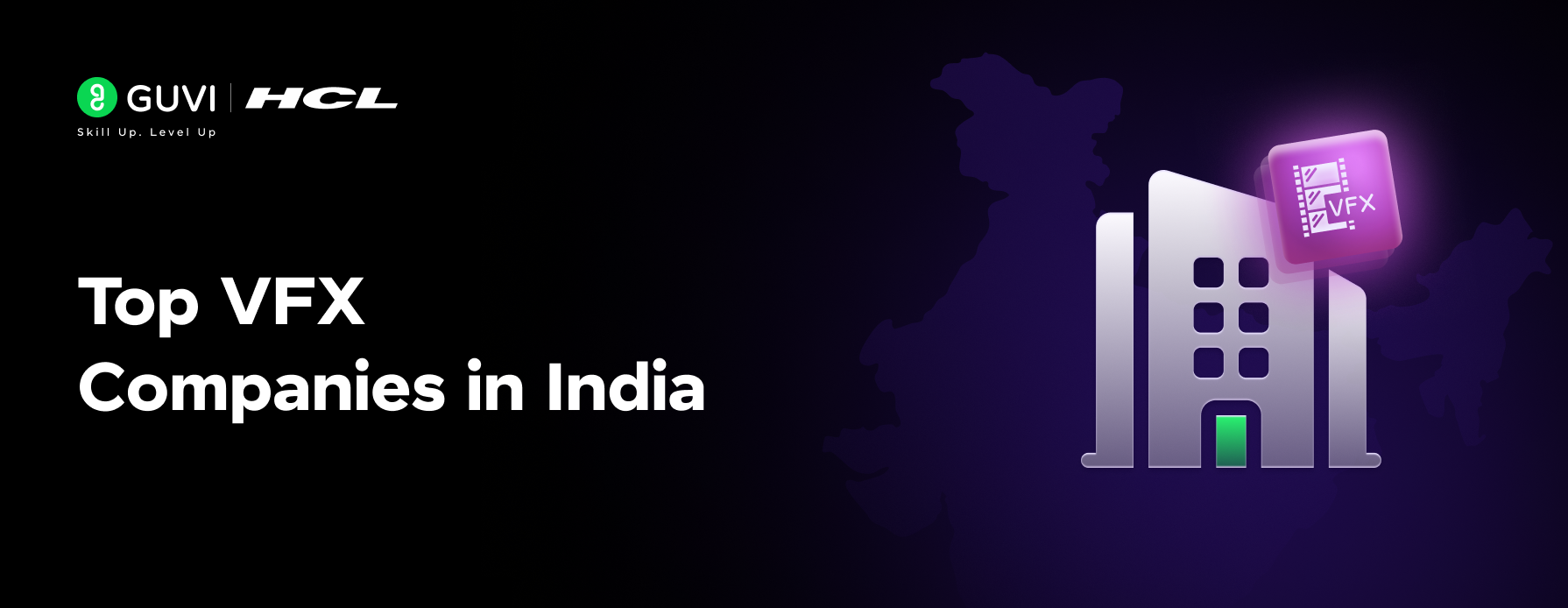
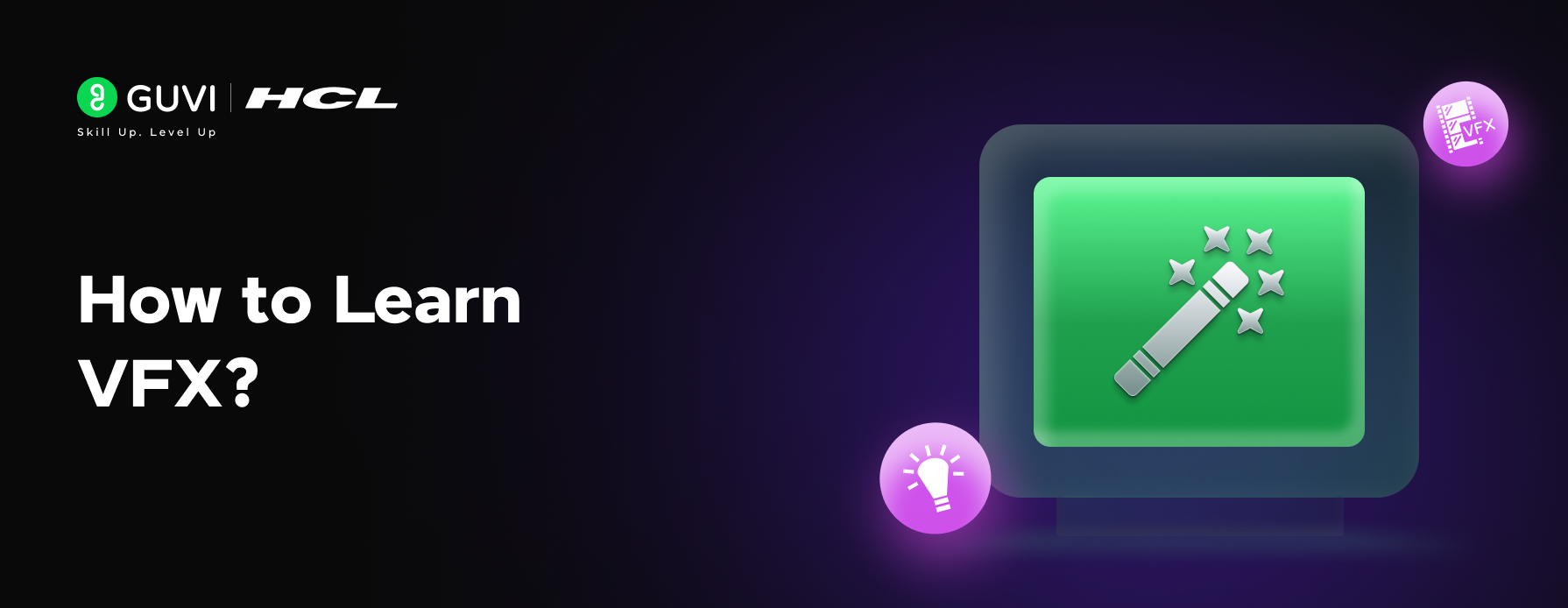

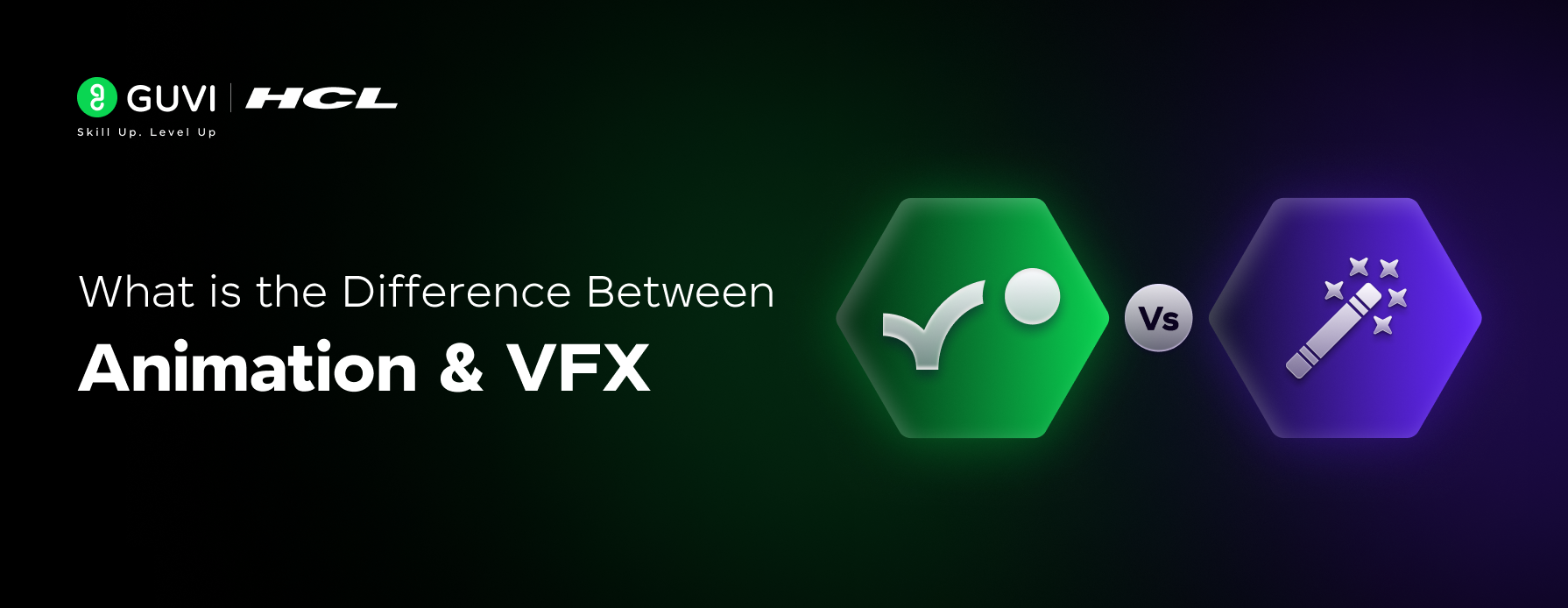
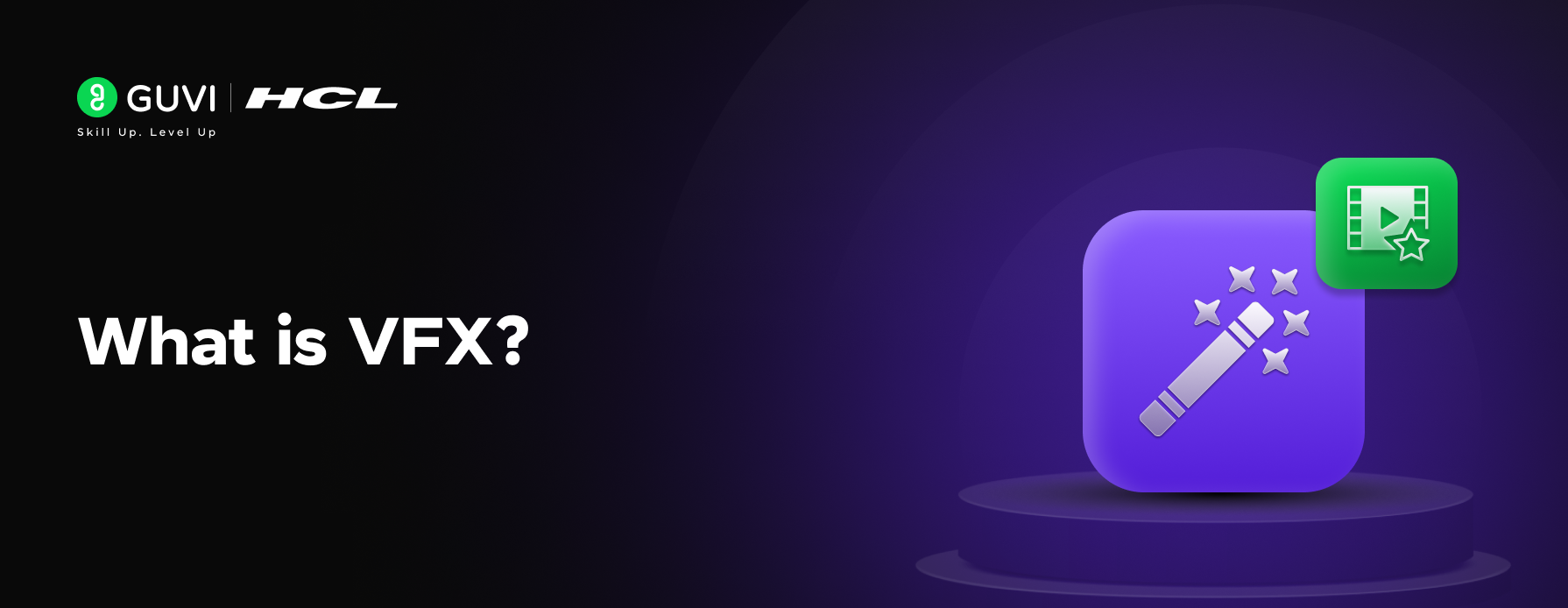
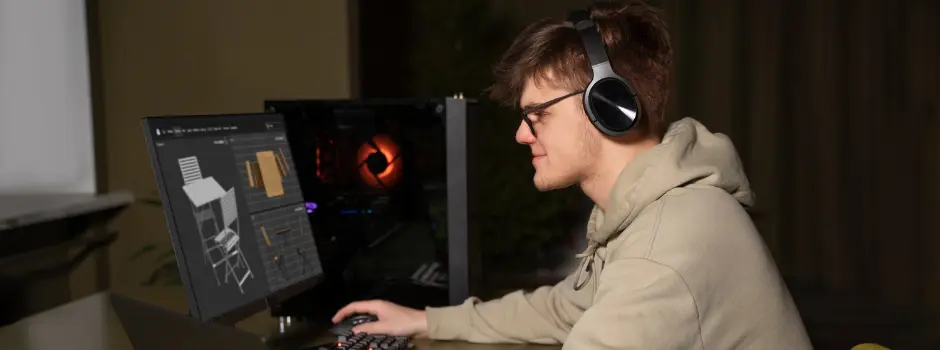
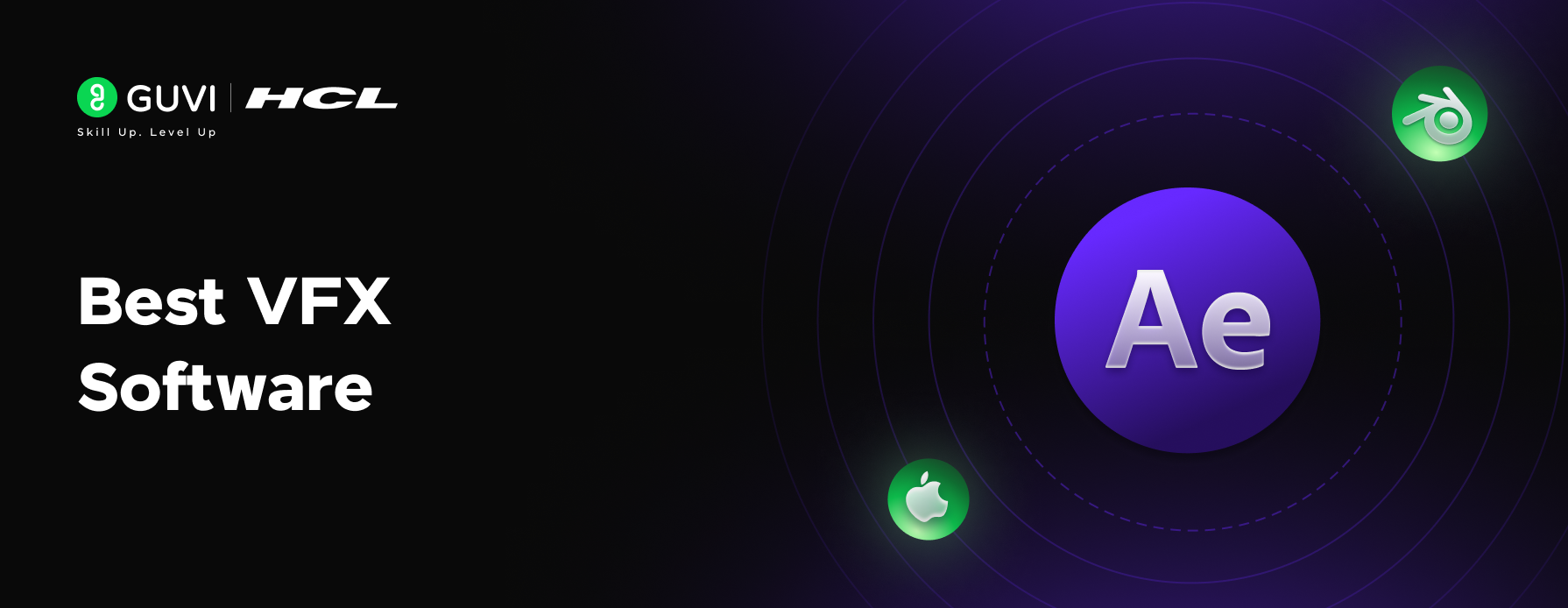

Did you enjoy this article?